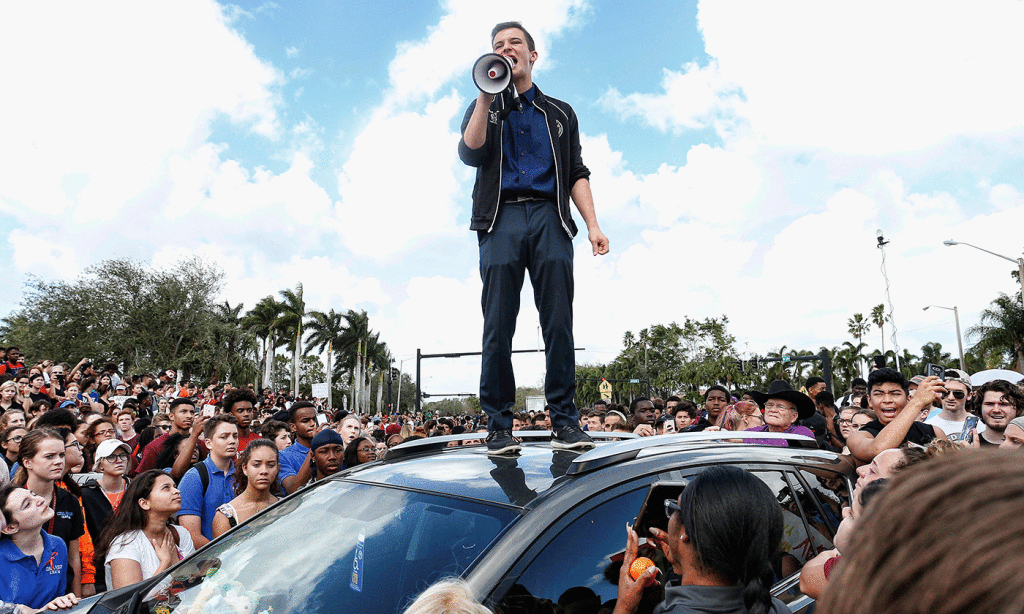Your Youth Shall See Visions
Our concluding blessing in our most central prayer, the Amidah, is a prayer for peace. This is in accord with our practice in general, to conclude any major series of blessings or prayers with words of peace. The text of the last blessing depends, in our Ashkenazic (European Jewish) custom, on whether the Priestly Blessing is part of the recitation of the communal Amidah. (Other customs include the recitation of this text always, even when the Priestly Blessing is not recited.) So in every morning service, and at many other times, the text of the blessing for peace is an expansion on the elements found in that ancient Biblical prayer:
“May the Eternal bless you and care for you;
May the Eternal shine His Face upon you and be gracious to you;
May the Eternal lift up Her Face to you and grant you peace.” (Num. 6:24-26)
(I have written about this beautiful text many times in my Torah Sparks comments for Parashat Naso, and, last year, in my Torah Sparks for B’Midbar/Shavuot/Naso.)
The phrases and values of the Priestly Blessing are echoed and embellished in our prayer for peace. It begins “Sim shalom – grant peace” where the Priestly Blessing ends: “v’yasem l’kha shalom – and grant you peace.” The blessing asks for peace even as it acknowledges that God has showered us with manifold blessings, including the blessing of peace, itself:
“For, by the light of Your Face (- a reference to the Priestly Blessing’s phrase, “May God shine God’s Face upon you.”) You have given us, Eternal, our Almighty One, a Torah of life, and love of loving-kindness (ahavat hesed), and righteousness, and blessing, and compassion, and life and peace.”
God’s gifts include a Torah of life, a Torah that enriches life as it gives us guidance on how to live. That gift is given to us by God. But then the blessing says that God has also given us a gift that is within us – the love of loving-kindness. God has given us a capacity for loving that extends to the love of love itself! This is the kind of soul that God has given us.
And then the blessing lists other values – righteousness, blessing, compassion, life and peace. How shall we read those words? One way is to see them as saying that God has shown us at different times in our history and our lives these precious qualities. These would be more examples of gifts that God has given to us. But perhaps we should read this listing as being about gifts within us – the capacity to love righteousness, to love blessing, to love compassion, life and peace. The gift God has bestowed upon us is a nature that is capable of holding these values as being not only right and just, not only necessary and inalienable. We are able to feel a passion for these values and to love them and to love seeing those who are committed to them live in ways that increase these values in the world.
The Priestly Blessing, as its name indicates, was originally spoken by the priests of old. But now we have incorporated it into our on prayers and we have established the beautiful custom for parents to recite these words as they bless their children on Shabbat. How did that idea of transferal arise?
I suggest that a clue can be discerned when we consider the structure of our Amidah prayer, as I have explained it in previous columns. This last prayer is one of three final blessings that all exist in chiastic relation to the first three blessings of the Amidah. That means that this last blessing is connected to the first blessing. That blessing brings us into God’s presence by recalling our ancestors and our parents. In discussing that first blessing, I wrote:
“What is the nature of that spiritual legacy? What about the ancestors was so special that God stood by them and with them, establishing a covenant that is our sacred inheritance? We could conceivably choose many qualities and attainments of our ancestors. So many of them are documented in the Torah portions we read during these weeks. But our blessing distills their attainments into only one phrase: ‘hasdei `avot v’imahot – the loving acts of our fathers and mothers.’ We do not celebrate their heroism, their righteousness, or their belief in God. We celebrate their evincing of love – hesed –hasadim.
This is what God remembers about them. And this is what we are meant to remember about them as their descendants and heirs. As we begin our prayers we are meant to remember our capacity to act lovingly. The first blessing wants us to realize “that our capacity to act lovingly is our beginning and our end; it is our calling card and it is the key to our redemption.” (Kol Emunah, Dec. 2015)
Thus, there is an inherent recognition of parent and child relations embedded within the daily recitation of the Amidah. We are mindful of our identities as children of parents who have been loving role models. We strive to continue that model. We bless our children to become like them. So, how amazing it would be to be as inspired by our children as we are inspired by our ancestors!
It is therefore tremendously moving for me to witness the rising of a new generation of youth who exemplify a sense of soulful capacity for loving life, righteousness and peace. I refer to the young people who has stepped out the blood and horror of the mass shooting in Parkland , Florida, to demand that their voices be heard, voices that demand that we stop making excuses for doing nothing. If we really loved life and peace, we would never let flimsy excuses get in the way of trying to realize those blessings. Yet we have become mired in our excuses and, instead of loving life, we have loved conflict and anger.
Instead of ignoring our youth, we should wake up and realize that we are privileged to be witnessing a prophetic moment. As the prophet describes his hopes for a better world, he predicts: “Your sons and daughters shall prophesy; your youth shall see visions!” (Joel 3:1)
I am thrilled that our Montclair High School is supportive of the Walk Out on March 14. I pray that any students in districts that are not supportive of the Walk Out will gain support from their families, friends and clergy so they will have the strength to act on their convictions despite negative pressure. I am heartened to learn that numerous universities have declared that any students applying for admission to their schools shall have no worries about any disciplinary actions taken against them for this demonstration. I am proud that United Synagogue is working to make it possible to participate in the March for Our Lives on the 24th and also honor Shabbat on that day.
Our young people have moved forward to confront our smugness and complacency. They are taking action in their sphere of power and they challenge us to mobilize our enormous power to make these values real. Can we look at our youth in the face and tell them that we really love these values?
Image: courtesy of yes magazine

